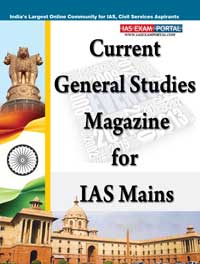(HOT) UPSC Current Affairs 2025 PDF
NEW! The Gist (NOV-2025) | E-BOOKS
Social and Cultural Issues based Article : Current General Studies Magazine (April 2017)

Current General Studies Magazine (April 2017)
General Studies - III "Social and Cultural Issues based Article" (Maoist Insurgency)
Commenting on the Maoist issue in the aftermath of the “horrendous killing of 25 CRPF soldiers in Sukma”, the editorial in Organiser notes that “the real challenge is how to fight the ideological and perception war that is going on in Delhi media and academic campuses”, where the “slogans of ‘Kashmir Mange Azadi’ are proudly coupled with ‘Bastar Mange Azadi’”. The Maoists “do not want development, peace and prosperity for the common people”, it says, noting that “almost all the attacks on the security forces took place around the areas where development work is going on in full speed”.
“The brutalities of Maoists are unbelievable, still they take the limelight of being liberationists,” it notes, underlining that “any action against them is immediately retorted to by the allegations of human rights violations”. The editorial claims that “no one is there to talk about the human rights of tribals who do not want to side with Red Terror”, as “even the police machinery” is “under the pressure of so-called human rights activists and organisations”.
These activists are “funded heavily by international networks”, the editorial alleges, urging the “government and people who are concerned with national integration” to come together to “defeat these draconian liberators, who claim to have monopoly over rights and wrongs in Bastar”.
Fake farmers
Taking note of the poor condition of farmers in the country, an article in Panchjanya comments on a recent demonstration of farmers from Tamil Nadu in Delhi. It questions their methods of demonstration when they “offered their blood” to the “effigy of Modi” and wore a garland of human skulls. “From where did they get those skulls? A body is cremated in the Hindu tradition and ashes are immersed in rivers,” it says, asking also, “from where did they get white rats to keep in the mouth as such rats are not seen normally”. “Can any farmer issue a warning of consuming his urine and excreta?” it asks, wondering who “nourished such thoughts?”
This movement, the article argues, was not led by the “Indian farmer”, but was “motivated by politics”. This movement was the result “of a major conspiracy against the government”. It was “exposed on social media” as “evidence” was presented about the “suspicious sources of their funding”, the article claimed. People also questioned the Tamilian leader of this movement as “no Tamilian farmer can eat rat and snake”. “These fake farmers of Tamil Nadu held their movement in Delhi for 41 days,” it says, asking if “the media can tell about their sponsors?”
More surveillance
The cover story in Organiser, ‘Urban Voices of Maoists’, underlines the “need to identify actors who have illicit connections” with the insurgents. “We have been told” that “a huge militia which aspires to overthrow the Indian state with armed rebellion is ‘Gandhi, but with Guns’”. It slams author Arundhati Roy, who “perverted… the whole narrative of Left-Wing Extremism (LWE)… to represent the Maoist guerrillas as Robin Hoods of Indian forests”.
“The last surviving hero of the Naxalbari uprising, Kanu Sanyal, was disillusioned with the course of the movement,” it says, underlining that he “committed suicide” “by hanging himself at his residence”. Claiming that the Maoist movement has taken a criminal turn, the report argues that “an imported ideology from China” “cannot deliver justice to anyone”. It identifies “the urban segment that persistently legitimises, sympathises with, and patronises Maoist violence” as a “huge threat” to the country. “These ideologues can be found everywhere in civil society, right from the media, university campuses, lawyers, human right activists, NGOs, etc.”
Maoist ideology is being groomed by respectable members of civil society in the urban sphere, the article thus argues, emphasising that the Indian state must now ensure proper “surveillance in the urban sphere as well”.
(Source- The Indian Express)

